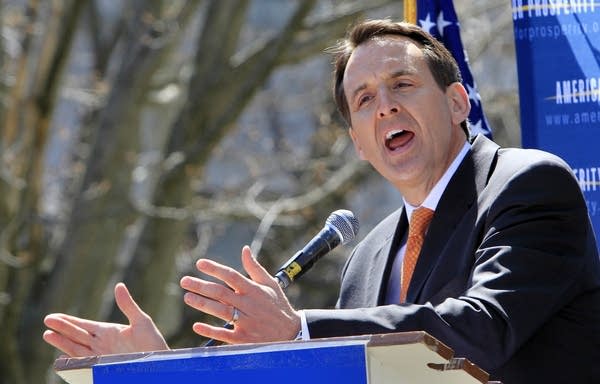A surprisingly early emphasis for Pawlenty campaign: foreign policy

Former Minnesota Gov. Tim Pawlenty has had little good to say about the Democratic president he hopes to challenge next year, and he has leveled some of his harshest criticism of Barack Obama in the area of foreign affairs.
"My basic perspective on foreign policy -- and this is oversimplifying, but in the interest of time -- is simply this: You may have learned it on the playground, you may have learned it in business, you may have learned in sports, you may have learned it in some other walk of life but it's always true is you're dealing with thugs and bullies they understand strength, they don't respect weakness," Pawlenty said in a campaign stop in Manchester, N.H. in March.
Pawlenty told the group the Obama administration's response to the uprising in Egypt was "incoherent," referencing among other things, Vice President Joe Biden's statement that Egyptian President Hosni Mubarak was not a dictator. On Libya, Pawlenty accused Obama of dithering on a decision about a no-fly zone at the expense of helping Libyans overthrow Moammar Gaddafi.
"I think if there's a plausible way to implement a no-fly zone we should and the president is thinking about it, thinking about it, but I would be more forward leaning than that."
Create a More Connected Minnesota
MPR News is your trusted resource for the news you need. With your support, MPR News brings accessible, courageous journalism and authentic conversation to everyone - free of paywalls and barriers. Your gift makes a difference.
Pawlenty said later he would have used U.S. special forces to remove Gaddafi.
Last week at the first GOP presidential debate, Pawlenty repeated his criticism of the Obama's administration's handling of Libya.
"What the president did is waited the better part of a month, he waited for the Arab League to give him permission. He waited for the United Nations to pass a resolution and then he made the mistake of saying and by the way American policy is to make Gaddafi go, but now he has his hands tied by the United Nations and has subordinated our decision making and options to that pathetic organization in many respects."
Christopher Preble, the director of foreign policy studies at the conservative Cato Institute, said Pawlenty has a point about Obama's tendency to seek international support before acting, with Libya being a prime example.
"At a minimum, it's clear that the Obama administration spent a lot more time lobbying the United Nations, the U.N. Security Council to endorse this mission, that is to give it official U.N. sanction than the administration did in talking to Congress," Preble said. "In fact, they only informed Congress really after then fact, after they had made the decision."
But Preble said the notion that Obama is somehow weak on defense is not supported by the evidence.
"We just killed Osama bin Laden, we the United States. The Obama administration has significantly increased the use of drone attacks against Al Qaida figures and Taliban figures in Afghanistan and Pakistan much to the chagrin of the Pakistani government, among others. So I guess it does beg the question, what more should we be doing? Should we have 200,000 troops in Afghanistan instead of 100,000? Should we be at war in Syria and Yemen as well as in Libya and Iraq and Afghanistan."
Washington University Political Science Professor Steven Smith said Pawlenty is focusing on foreign policy because it's in the news and he wants to get his name better known.
"Pawlenty, who's often shown to be sitting at 3 or 4 percent among Republicans, can hope that just simply by distinguishing himself on these issues stylistically he can bring that up a couple of percentage points and become more competitive," Smith said. "He really does risk at this stage being kind of lost in the crowd."
Smith also said portraying Obama as weak on defense plays well to core GOP voters who will decide which Republican will get the chance to run against Obama next year. He said discussion of national security issues will likely loom larger within the GOP nomination battle than it will during next year's general election campaign, when jobs and the economy will be the main focus.
